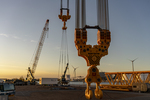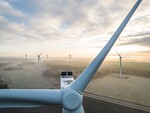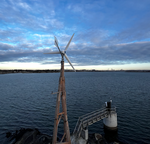12/09/2009
Philippines - Small-scale wind power
It is amazing how the wind turbines in the northern part of the Philippines are not only picturesque that draw tourists; they can, in fact, generate 25 megawatts of electricity and are connected to the Luzon grid. What is even more interesting is the creation of a unique project between Philippine and Japanese partners that attempts to harness wind energy using small wind-power units in the urban setting.
As part of maintaining the country’s ranking as Southeast Asia’s No. 1 wind-energy producer, a project was developed through the partnership of the Industrial Technology Development Institute of the Department of Science and Technology (Itdi-DOST), Japan External Trade Organization (Jetro), International Center for Environmental Technology Transfer (Icett) and Loopwing Co. Ltd.
Small-scale wind-power generation:
According to Loopwing president Minoru Yoshida, policymakers and utility companies around the world preferred large-scale power plants in a form of centralized distribution system. However, their preference was challenged by public awareness on climate change, high-energy prices and energy-security factors. These forces paved the way for promoting Microgeneration technologies.
Small wind is one of Microgeneration technologies defined as power-generation technologies with capacity of below 100-kilowatt (kW) or 50-kW in some cases, Yoshida added. He said there have been many types of wind turbines developed throughout history. Most of them failed in efficiency and reliability. Vertical-axis wind turbines, for instance, may have an advantage in capturing wind from any direction, but these types suffer from imbalance of torque between the right and left side, which causes vibration. The vibration increases in proportion to the energy they try to produce, he added. By the late 1990s, the emergence of horizontal-axis-type wind turbine had been proven. Loopwing was able to overcome the problems encountered by conventional wind turbines.
The blade of Loopwing is in a loop-shape and has no pointed tip to create a vortex. This means that it structurally removes the cause of troublesome noise and drag force, Yoshida said. Having a 20-year design life, Loopwing is equipped with three to four fail-safes ensuring the safety in typhoons or during power outages. In three sites in the country—Itdi-DOST in Taguig City, City Environmental Management Office in Marikina City and Guaranfood in San Pablo City, Laguna—the project demonstrates that small wind generators can be used even with low wind velocity and varied wind directions, Science Undersecretary Graciano Yumul said.
First site:
The roof deck of the Fuels and Energy Division (FED)-Itdi building is the home of the first Loopwing wind turbine system. The output of the wind-turbine, according to Itdi science research specialist Marianito Margarito is connected to the electrical panel of the first floor of the FED-Itdi building.
The power output is used by some of the electrical load of the building and the generated electrical power reduces the demand from the grid, Margarito added. As of November 26, the system has generated 3-kw per hour of power.
Moreover, he said the system requires no maintenance and minimal operator intervention, as it is easy to operate and fully automatic. Its minimum cut-in velocity is useful for urban locations, he added.
Second site:
The Cemo served as the final location in Marikina City after considering several locations in the city that were disapproved due to some factors, according to Gloria Buenaventura, city environment officer and assistant city administrator of Marikina City. The city government officials and project partners inaugurated the newly built Loopwing wind turbine on November 23. The 2-kW-capacity Loopwing wind turbine 2850 was installed under the supervision of DOST and Japanese experts. The wind turbine is connected to the Marikina Composting Facility in powering the bioreactor and its lighting requirements, Buenaventura said. Among the benefits of the Loopwing wind- turbine demonstration are savings in electrical consumption in the operation of Marikina Composting Facility; technical knowledge in renewable energy; added tourist and media attraction to the city; easy promotion of the use of renewable energy to the people of Marikina; and gain collaboration with partner-agencies, she said.
Third Site:
Guaranfood Manufacturing Inc., a manufacturer of sauces, condiments, dressings and pickles, was chosen to be a demonstration site of the Jetro Pilot Demonstration Project (PDP) in the Calabarzon. The electrical load of the wind turbine is connected to the main panel board of the maintenance shop and supplies the power requirement of the lighting system and other equipment connected to the panel, Nieva Doria, officer in charge of QA Department of Guaranfood said. She said the potential benefits of the project include savings in power consumption, clean source of energy, reduce impacts to the environment, enhance corporate image and instill environmental awareness to the employees of Guaranfood and communities of San Pablo City.
Joseph Herrera, a senior science research specialist at ITDI and an Icett graduate, said the three sites of Jetro PDP are still relatively new and require additional monitoring to gather additional data. These data will serve as a platform for the country to analyze the possible proliferation of small-wind energy not only in urban areas but in other areas as well.
In the same light, Itdi-DOST director Nuna Almanzor added that the project aims to collate data that could possibly result in an economic study that would look into least costs in producing and replicating the wind turbines by tapping the local suppliers with the help of the Japanese experts.
This, according to Almanzor, will cheapen the prevailing high costs of putting up wind turbines and can encourage more adapters of wind-energy generation in other places.
For more information please contact Trevor Sievert at ts@windfair.net
As part of maintaining the country’s ranking as Southeast Asia’s No. 1 wind-energy producer, a project was developed through the partnership of the Industrial Technology Development Institute of the Department of Science and Technology (Itdi-DOST), Japan External Trade Organization (Jetro), International Center for Environmental Technology Transfer (Icett) and Loopwing Co. Ltd.
Small-scale wind-power generation:
According to Loopwing president Minoru Yoshida, policymakers and utility companies around the world preferred large-scale power plants in a form of centralized distribution system. However, their preference was challenged by public awareness on climate change, high-energy prices and energy-security factors. These forces paved the way for promoting Microgeneration technologies.
Small wind is one of Microgeneration technologies defined as power-generation technologies with capacity of below 100-kilowatt (kW) or 50-kW in some cases, Yoshida added. He said there have been many types of wind turbines developed throughout history. Most of them failed in efficiency and reliability. Vertical-axis wind turbines, for instance, may have an advantage in capturing wind from any direction, but these types suffer from imbalance of torque between the right and left side, which causes vibration. The vibration increases in proportion to the energy they try to produce, he added. By the late 1990s, the emergence of horizontal-axis-type wind turbine had been proven. Loopwing was able to overcome the problems encountered by conventional wind turbines.
The blade of Loopwing is in a loop-shape and has no pointed tip to create a vortex. This means that it structurally removes the cause of troublesome noise and drag force, Yoshida said. Having a 20-year design life, Loopwing is equipped with three to four fail-safes ensuring the safety in typhoons or during power outages. In three sites in the country—Itdi-DOST in Taguig City, City Environmental Management Office in Marikina City and Guaranfood in San Pablo City, Laguna—the project demonstrates that small wind generators can be used even with low wind velocity and varied wind directions, Science Undersecretary Graciano Yumul said.
First site:
The roof deck of the Fuels and Energy Division (FED)-Itdi building is the home of the first Loopwing wind turbine system. The output of the wind-turbine, according to Itdi science research specialist Marianito Margarito is connected to the electrical panel of the first floor of the FED-Itdi building.
The power output is used by some of the electrical load of the building and the generated electrical power reduces the demand from the grid, Margarito added. As of November 26, the system has generated 3-kw per hour of power.
Moreover, he said the system requires no maintenance and minimal operator intervention, as it is easy to operate and fully automatic. Its minimum cut-in velocity is useful for urban locations, he added.
Second site:
The Cemo served as the final location in Marikina City after considering several locations in the city that were disapproved due to some factors, according to Gloria Buenaventura, city environment officer and assistant city administrator of Marikina City. The city government officials and project partners inaugurated the newly built Loopwing wind turbine on November 23. The 2-kW-capacity Loopwing wind turbine 2850 was installed under the supervision of DOST and Japanese experts. The wind turbine is connected to the Marikina Composting Facility in powering the bioreactor and its lighting requirements, Buenaventura said. Among the benefits of the Loopwing wind- turbine demonstration are savings in electrical consumption in the operation of Marikina Composting Facility; technical knowledge in renewable energy; added tourist and media attraction to the city; easy promotion of the use of renewable energy to the people of Marikina; and gain collaboration with partner-agencies, she said.
Third Site:
Guaranfood Manufacturing Inc., a manufacturer of sauces, condiments, dressings and pickles, was chosen to be a demonstration site of the Jetro Pilot Demonstration Project (PDP) in the Calabarzon. The electrical load of the wind turbine is connected to the main panel board of the maintenance shop and supplies the power requirement of the lighting system and other equipment connected to the panel, Nieva Doria, officer in charge of QA Department of Guaranfood said. She said the potential benefits of the project include savings in power consumption, clean source of energy, reduce impacts to the environment, enhance corporate image and instill environmental awareness to the employees of Guaranfood and communities of San Pablo City.
Joseph Herrera, a senior science research specialist at ITDI and an Icett graduate, said the three sites of Jetro PDP are still relatively new and require additional monitoring to gather additional data. These data will serve as a platform for the country to analyze the possible proliferation of small-wind energy not only in urban areas but in other areas as well.
In the same light, Itdi-DOST director Nuna Almanzor added that the project aims to collate data that could possibly result in an economic study that would look into least costs in producing and replicating the wind turbines by tapping the local suppliers with the help of the Japanese experts.
This, according to Almanzor, will cheapen the prevailing high costs of putting up wind turbines and can encourage more adapters of wind-energy generation in other places.
For more information please contact Trevor Sievert at ts@windfair.net
- Source:
- Loopwing
- Author:
- Posted by: Trevor Sievert, Online Editorial Journalist / Loopwing
- Email:
- ts@windfair.net
- Link:
- www.windfair.net/...
- Keywords:
- wind energy, renewable energy, wind turbine, wind power, wind farm, rotorblade, onshore, offshore









